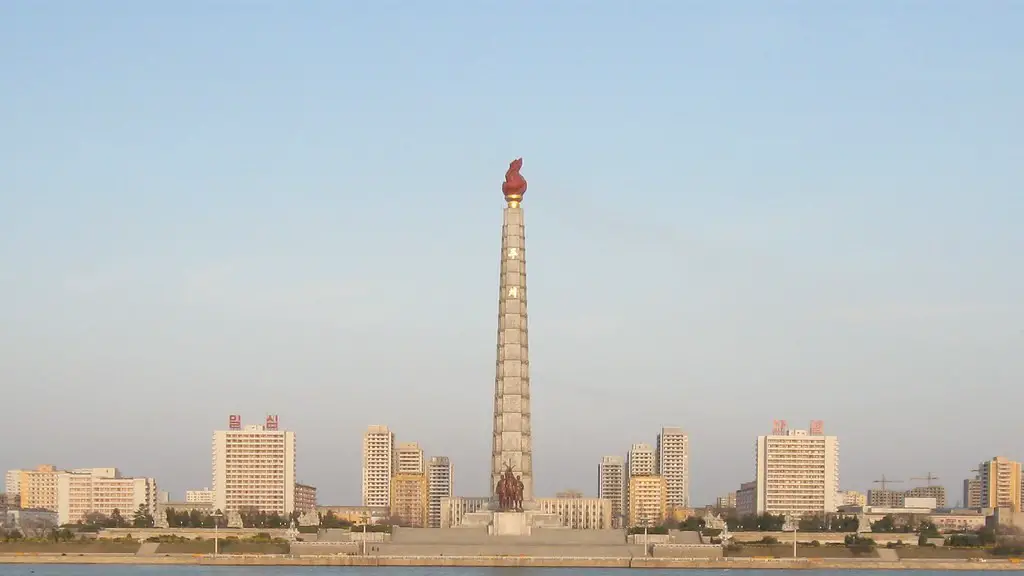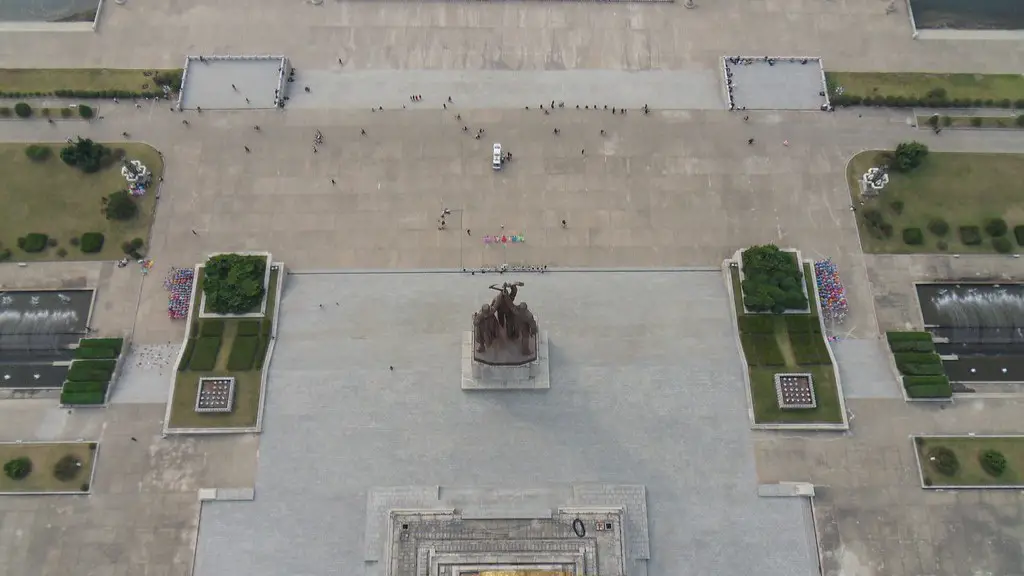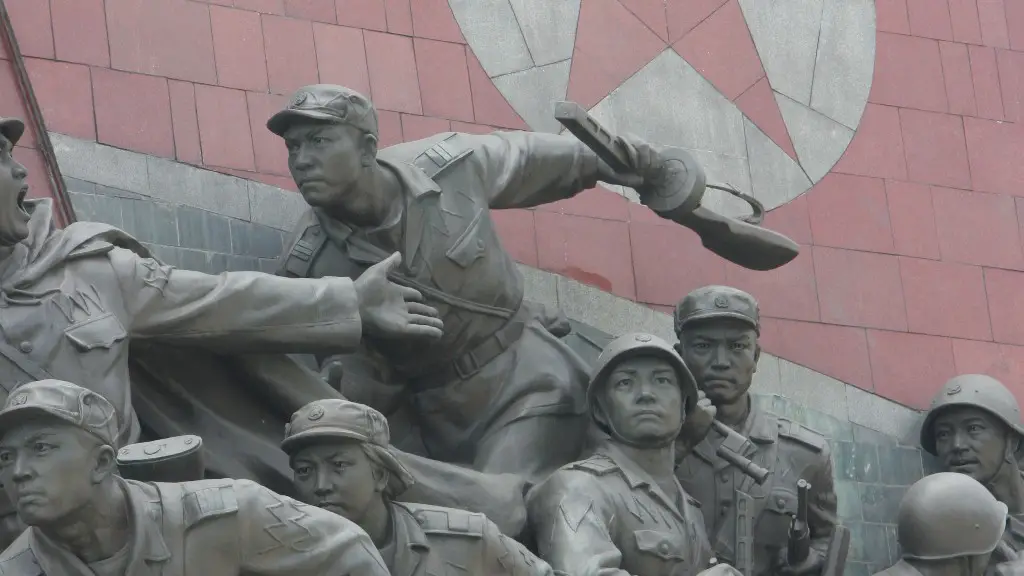The looming question of whether or not North Korea will attack has become a central topic of discussion among world leaders, security experts, and civilians alike. North Korea, which is led by Kim Jong-Un, is a country with a dramatic past and an uncertain future. What would a potential North Korean attack look like? How likely is it, and what might be the consequences?
The unpredictability of North Korean’s reigning leader, Kim Jong-un, has caused alarm for many countries in the region and around the world. Kim has repeatedly threatened military action against neighbor South Korea, as well as the United States. He has also instilled fear through the usage of nuclear tests and intercontinental ballistic missiles.
There are numerous theories as to why North Korea attacks. Some argue that they do it as a means of gaining political attention. Others suggest that they are attempting to intimidate their rivals and allies, while also defending their nation’s sovereignty. North Korea has also made it clear that they want a unified Korean peninsula, though this is viewed by many within South Korea and the United States as an unrealistic goal.
Regardless of their motives, predictions about when a North Korean attack might take place are difficult to make. Although a sudden attack could take place at any moment, military and political experts have suspected that any such attack might come from economic sanctions imposed by the United Nations Security Council. These sanctions are largely directed at the North Korean economy and have been used as a measure to get the country to halt their development of a nuclear program.
Leaders from South Korea, China, and the United States have all stated that they prefer a diplomatic approach to de-escalating tensions in the region. The United Nations has also kept a close eye on the situation and has encouraged the parties to come to a peaceful resolution. With that said, the North Korean government has proven to be resistant to sanctions and attempts of diplomacy.
The potential consequences of a North Korean attack would be catastrophic. North Korea is believed to possess a high amount of nuclear weapons and could very easily strike multiple targets in the region if it were to come to that. The United States and other countries in the region have build-up their military defense mechanisms, but an all-out nuclear war could cause devastating damage to the infrastructure of many countries in the region.
North Korean relations with other countries have the potential to shift at any given moment, making it difficult to accurately predict when an attack might come. Although military and political experts have investigated the circumstances of a potential attack, the bottom line is that anything can happen at any time. It is essential that countries in the region and the world continue to take preventative measures to protect citizens and ensure peace and security.
What Could an Attack Look Like?
If North Korea were to decide to launch an attack, it is highly likely that they would use their nuclear weapons as a means of deterrence or warfare. Nuclear weapons, specifically intercontinental ballistic missiles, could be launched from North Korea to other parts of the world or used against South Korea, which is in close proximity to the north. Additionally, North Korea could also attack through conventional means, such as ground forces.
If a nuclear attack were to take place, the effects could be widespread. Countries in the region would be the most affected, with long-term implications for the environment, economics, and society. In a worst-case scenario, it could even lead to World War Three, a devastating event that would affect countries around the globe.
Will Diplomacy Work?
Given North Korea’s past belligerence and its refusal to cooperate with sanctions, it is difficult to determine whether diplomatic efforts will be successful in staving off potential attacks. International leaders are well aware of North Korea’s ambitions and the threats they pose, so they have worked to keep North Korea in check through diplomatic initiatives such as the Six-Party Talks, which include Japan, South Korea and the United States.
These talks, however, have proven to be unsuccessful in the past, and there have been no public outreaches for diplomatic solutions since the collapse of the talks in 2008. While it is possible that North Korea could respond to diplomatic initiatives in the future, it is uncertain whether or not these efforts will be effective at preventing a potential attack.
Consequences of a North Korean Attack
The consequences of a North Korean attack would be especially severe in places like South Korea, which is in close proximity to the north. The South Korean economy, which is heavily reliant on exports, would be devastated by an attack. Not only would there be extensive damage, but the psychological and social effects of such an attack would also be immense.
North Korea is also believed to possess cyber warfare capabilities, so a North Korean attack could arise in the form of a malicious cyber-attack. This could cause targeted disruption to government and private networks, as well as compromise of key infrastructure such as transportation, banking, and energy systems.
Furthermore, North Korea is believed to be amassing this technology, which means that future attacks could be more sophisticated and difficult to address. As such, countries in the region must be prepared to combat these threats, and it is essential for them to invest in their cyber defense infrastructure in order to protect themselves from potential attacks.
Is War Inevitable?
Ultimately, the threat of a North Korean attack is ever looming, yet it is impossible to know when and if such an attack will take place. With that said, countries in the region must strive to be prepared for the worst-case scenario. Calls for diplomacy are all well and good, but there is no guarantee that it will prove to be successful. As a result, countries must be willing to take the necessary steps to ensure the security of their citizens and the stability of the region.
Although war appears to be a real possibility, it is in nobody’s interest that it should come to pass. It is important that all parties continue to work together to seek a diplomatic solution while at the same time being prepared to respond with the necessary military resources in the event of a potential attack.
Increase in Surveillance Activities
In addition to diplomatic efforts and increased military preparedness, countries in the region have also started to focus on increasing their surveillance activities. This includes an increased presence in the Korean Peninsula, as well as aerial and naval surveillance operations that can detect any threats or possible signs of aggression.
Furthermore, countries in the region have also taken steps to strengthen their intelligence activities. They have done this in order to stay ahead of any potential threats, such as those posed by North Korea. By gathering intelligence about North Korea’s nuclear and missile programs, countries can better prepare for an attack and respond in an appropriate manner.
In the absence of an effective diplomatic solution, increased surveillance and intelligence operations are one of the most effective ways to prepare for a North Korean attack. It is also essential that countries in the region continue to work together in order to ensure that they can respond to this threat with a unified front.
United Nations Response
The United Nations has also been actively monitoring the situation and has called for an end to the threats against South Korea and the United States. The UN Security Council has imposed multiple sanctions on North Korea, which have been largely ineffective in curtailing its nuclear and missile programs. It is unclear whether or not the UN will take further action to address this issue, though the organization has said that it will continue to monitor the situation closely.
Given the significance of the issue and the unprecedented level of tension, it is essential that the United Nations take a proactive approach and put pressure on North Korea to cease their aggression. If the UN fails to do so, then it is likely that the situation will continue to deteriorate, leading to potential war and destabilization in the region.
It is unclear how the United Nations will respond to a potential North Korean attack. It is certain, however, that the organization must take a strong stance in order to prevent the situation from escalating. In addition, it is essential that the UN works together with other countries in the region in order to find a diplomatic solution to this crisis.





